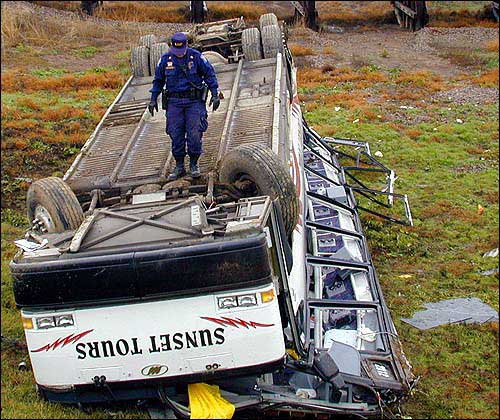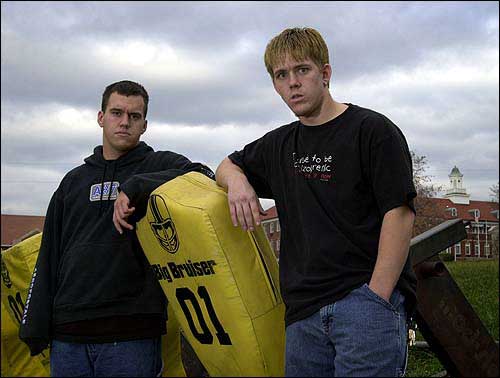A crash unheard
Caring town inspires deaf accident victims
SHARON SPRINGS ? As their bus barreled through the rain and fog of a late October morning, Tyler Thompson and his teammates settled in for a long trip across Kansas.
Some slept, while others chatted about the excitement of the day before, when the Jackrabbits beat a Colorado football team 72-14. That night, they had gone to the school’s Homecoming dance.
A few rows away, senior captain Chuck Arwood was trying to read a book, but he was feeling uneasy.
The bus seemed to be going awfully fast, and Arwood grew increasingly nervous as it swayed back and forth across the prairie of western Kansas.
Suddenly, he could feel the bus skidding sideways on the slick road and saw dirt flying on the windows. Arwood hung onto an overhead luggage compartment as the bus slid off the road, ripping out windows and sending players and cheerleaders tumbling about like rag dolls.
The bus skidded on its side, then tipped over, crushing the roof and tossing some students out into a wet ravine.
Cold, scared and confused, some began to panic.
A passing motorist saw the crash, and within minutes the only lawman in Wallace County, Sheriff Larry Townsend, was speeding to the scene.

Wallace County Sheriff Larry Townsend visits a the gouged highway embankment where a bus carrying the Kansas School for the Deaf high school football team crashed Oct. 27. Members of the small rural community of Sharon Springs rallied to assist the victims of the crash involving 34 passengers. The crash resulted in the death of the school's assistant football coach.
The anguished cries were unlike anything he had ever heard. He saw their desperate faces ” and their hands. They were pleading for help with their hands.
“They were all trying to converse with us,” Townsend said. “We didn’t know what they were saying.”
Soon, it became apparent why.
The bus was carrying 34 students, coaches and cheerleaders from the Kansas School for the Deaf.
The crash killed assistant coach Lory Kuschmider; everyone else survived, though many had broken bones and deep contusions.
“It was like these kids had a guardian angel watching over them,” said Celeste Rains, the doctor who treated most of them.

An accident investigator walks on the belly of an overturned charter bus in this Oct. 28 file photo. The bus, carrying the Kansas School for the Deaf high school football team and cheerleaders, overturned the previous day near Wallace, killing assistant coach Lory R. Kuschmider.
Lying in the ravine, they couldn’t tell rescuers what hurt. They couldn’t hear the promises that help was on the way.
And they didn’t know the people of Sharon Springs were already rallying to their aid.
Mayberry, Kansas
There’s not much to do in tiny Sharon Springs, the county seat of sprawling Wallace County in the middle of far western Kansas.
The Strand Theater on Main Street shows movies on Friday and Saturday nights, and hunting season usually brings sportsmen eager to shoot some of the deer that wander through town or pheasants in the fields.
Farming and cattle ranching keep the town of 800 going. On weekday mornings, ranchers in overalls and dirty baseball caps discuss the world over coffee at the SS Country Store.
“It’s somewhat of a cross between Mayberry and Dodge City,” said Townsend, whose office houses a two-cell jail that would have felt like home to the town drunk Otis on the old “Andy Griffith” TV series.
Thirty miles from anywhere, and 40 miles from the nearest hospital, the people of Sharon Springs figured out long ago they had to take care of each other.

Kansas School for the Deaf football players Tyler Thompson, left, and Chuck Arwood stand at the school's football field across from the school in Olathe. The pair were among the 34 passengers on a charter bus carrying the team home from a game in Colorado when it crashed near Sharon Springs in late October.
Their ambulances are hand-me-downs, and one of the two volunteer fire department pumpers is a bright red 1952 Chevrolet. When someone calls for medical help, the phone automatically rings in the homes of 26 volunteer emergency medical technicians.
“They just do what they hope someone will do for them,” volunteer EMT Amy Sharp said. “Everybody looks out for everybody here.”
On this Sunday morning, many were in church when the call came. Eight miles up U.S. 40, a charter bus driven by 60-year-old Ronald Zimmerman of Raytown, Mo., was going more than 80 mph when it failed to negotiate a slight turn and plunged down a grassy embankment between a railroad bridge and the road.
At the Weselyan church, opening prayers were interrupted with the news and people dressed in their Sunday best piled into SUVs and headed toward the scene.
The town’s two volunteer ambulances raced to the crash, and five others responded from other counties. In all, 13 volunteer firefighters and 16 volunteer medics went. So did dozens of ordinary townspeople, ready to do whatever was needed.
In the mud and cold, they struggled together to bring the badly injured up the steep and slick embankment.
“I didn’t see a stretcher leave the bottom of that ravine without five or six people handling it,” Townsend said. “And we needed all of them.”
Help in chaos
Erin Townsend was hardly skilled in signing, which she learned in community college but had used only once. Still, she was able to give some of the frightened students what they were desperate for ” a way to communicate.
No one in town would have guessed it, but there were eight people who knew enough sign language to help.
“They weren’t very good interpreters,” the 18-year-old Arwood said. “But they were good enough.”
Townsend, the sheriff’s daughter, rushed from church in high heels and a dress. She and the others slogged through the mud in the chaos of the crash site trying to find whoever was hurt.
“People would see you signing to someone on a stretcher and they would grab your shoulder so you would talk to them,” Townsend said. “I just tried to give them some comfort.”
Along the highway, townspeople lined up their SUVs to take those who weren’t seriously injured the 40 miles to the nearest hospital in Oakley, a town of about 1,800 in adjoining Logan County. Those injured the worst were loaded into the ambulances.
Erin Townsend got into one with Kyle and Chester Kuschmider, sons of the assistant football coach.
“One of the boys had a broken hip, but his main concern was his father who had been in the bus, too,” she said. “He kept asking where he was, how he was. The closer to the hospital we got, the more upset he got. I think the shock was wearing off.”
A few ambulances ahead was Chris Hansen, a former military paramedic who is the closest thing there is to a doctor in Wallace County.
He was working frantically on Lory Kuschmider.
“I did CPR on him all the way to Oakley, which is darn far when you’re doing that,” Hansen said. “He just never regained his pulse.”
At the hospital, Kuschmider’s boys were anxious for word of their father.
With their hands, they pleaded for Townsend to stay.
With her hands, she could have told them he was dead. But she couldn’t find the words.
“They were so worried about their dad,” Townsend said. “It was heartbreaking. I didn’t know what to say.”
‘A humble man’
In the faded newspaper clipping from 1967, Lory Kuschmider is pictured along with his football coach at Lutheran West High School in Cleveland.
“Lutheran West gridiron handles hurdles with determination,” the headline said.
Deaf in a hearing world, Kuschmider was the school’s fullback. He would go on to graduate from Gallaudet University for the deaf, where he pitched on the baseball team and was a member of the famed “Dirty 30” football team in 1971.
A teacher and overnight dorm supervisor at KSD, he was also the head track coach and an assistant football coach.
His two sons, both deaf, attend the school. His wife, also deaf, teaches there.
To the students, he was a calm presence; someone who was a success despite his disability.
When Kuschmider spoke to players, he would always begin by saying with his hands, “Important, that you …”
“He was a very humble man and a wonderful coach,” said Thompson, the only student on the bus who had marginal speech and hearing. “We wanted to learn from him. He had so much knowledge. It was like he was a football book.”
Football is big at KSD, a collection of red brick buildings set in the leafy Kansas City suburb of Olathe. The team is a regular contender in the Great Plains School for the Deaf Conference, and was 5-4 after beating the Colorado School for the Deaf and Blind that Saturday afternoon in Colorado Springs.
Cheerleaders encourage the team with silent cheers. Players use hand signals and touches to communicate. Instead of yelling, they wave wildly.
“It’s the same, but quieter,” Thompson said.
Across the street from the school is a football field, not quite level and slightly overgrown. At each end are goalposts, with a small pair of rickety bleachers on each side.
They’ve always wanted to light the fields, and now they probably will with donations made in Kuschmider’s name.
On a recent day at KSD, preschoolers played with toys and talked to each other with their hands. In a sixth-grade class, students watched as a teacher signed a science lesson.
Most of the 150 students live at the school. It’s hard being away from family, but they find comfort among others who share their disability.
“It’s a small school, like a family feeling,” said Mike Muszynski, the high school dean. “The deaf community here has a stronger bond.”
Muszynski’s daughter Michele, a cheerleader, and son Dean, a fullback and defensive back, were on the bus. Michele was airlifted to a Wichita hospital for a neck injury, while Dean was bruised and cut but has recovered.
The emotional scars will take longer.
“My son is still angry and feeling guilty that he wasn’t one of them hurt,” Muszynski said.
Eight hundred people turned out for Kuschmider’s funeral services. The season’s final game was canceled, and the Jackrabbits didn’t play in the conference playoffs out of respect for their late coach.
In the school’s cafeteria, three tables are filled with cards, flowers and remembrances. The walls are covered with banners bearing sympathy messages from deaf schools in other states.
“I’m sorry. God bless you,” one said.
Quiet triumph
In the hallways at KSD, dorm teacher Connie Ruberry keeps an eye on the sleeping students without the boss she used to spend long nights with, discussing the world.
She’s not the only one who misses Lory Kuschmider.
“Several boys are still waking up at night thinking of him,” Ruberry said. “One boy can’t stay in bed because he was so used to seeing Lory every night.”
Still, these are kids who already know what it is like to overcome hurdles.
Some 400 miles across Kansas, the mood is brighter in Sharon Springs, where on a recent morning a worker strung Christmas lights across Main Street and children played noisily on the school playground.
“People showed up to help that didn’t know these kids or where they came from. And we could have had 10 times more if we needed it,” said Amy Sharp, the EMT. “That’s what being in a small community is all about.”
A tragedy for a school was a moment of quiet triumph for the people of western Kansas.
“There were so many people who were so nice to us. They didn’t have to be but they were,” Thompson said.
“They’re the nicest people I’ve met in a long time.”







